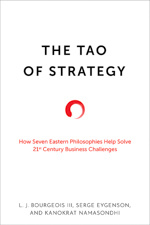Today, we are happy to bring you our conversation with L. J. Bourgeois III, Serge Eygenson, and Kanokrat Namasondhi, coauthors of THE TAO OF STRATEGY How Seven Eastern Philosophies Help Solve Twenty-First-Century Business Challenges (September).
In writing The Tao of Strategy, the authors’ brought together three diverse backgrounds:
- Raised in South America, Bourgeois is Emeritus Professor at the Darden School of Business and author of several articles and books on strategy. His consulting led him to apply strategy principles across numerous cultures around the world.
- Born in Russia and raised in the U.S. and Europe, Eygenson formed a company to teach mindfulness to business executives prior to his MBA. He is currently a consultant at a leading strategy consulting firm.
- Based in Thailand, Namasondhi is a Theravada Buddhist who went to a Jesuit high school in Bangkok. She is a consultant at a global management consulting firm and a CFA charter holder.
*************
What inspired you to write this book?
All three authors are strategy practitioners intrigued by how strategy comes from both rigorous analysis and creative serendipity, a serendipity that often arises in an open mind free from preconceptions and ego investment.Western MBA training provides the former – the analytical tools – and Eastern philosophical thinking supports the latter.We intersected at business school, found a common interest in “how strategy happens,” and built an elective on Strategy and Eastern Philosophy. The experience together led us to our book, whose aim is twofold:(1) to explore how Eastern philosophical thinking facilitates a “beginner’s mind,” and (2) to build on this exploration by observing how Eastern executives with Western educations combine analytical rigor with mindfulness and equanimity in their management styles.
What did you learn and what are you hoping readers will learn from your book?
Our book has a simple thesis – strategic insights, or coups d’oeil, occur when we connect existing knowledge in new and surprising ways to address the nuances of a specific strategic challenge. These flashes of insight occur unexpectedly and can’t be forced. Yet, looking to Eastern teachings, we draw out a range of lessons on how to best position ourselves to benefit from coup d’oeil. Our project taught us how strategic insights can be drawn from each philosophy, as well as how the lessons from various philosophies complemented each other. Readers will be exposed to new ways of addressing strategic decisions, with a focus on bringing intelligence, happiness, peace and success to their professional and personal lives.
What surprised you the most in the process of writing your book?
As we describe in the book, Eastern philosophy and Western organizational strategy may at first appear contradictory. Western strategy-making is typically conceived of as a highly analytical, structured, and linear process. Eastern teachings often encourage us to think of the world as iterative, non-linear, and driven by forces far beyond our abilities to describe using language, much less data.
Yet, as we wrote the book, we were surprised again and again by the potential complementarity between Eastern philosophy and Western strategic frameworks.During our field research in Asia, Europe and America, we marveled at the wide array of leaders who combined analytical rigor with a mindset inspired by Eastern philosophies and practices to drive better strategic thinking.
What’s your favorite anecdote from your book?
CEO Nok Anulomsombut addressed the threat to her company by cupping her hands as if around a stone, pushing the stone forward, and describing the problem as being “out there” and not residing within her. Having removed the crisis from her ego, she went home, showered, watched TV, and meditated. A solution to the challenge came to her overnight.
Describing the leadership and management styles of Apple founder Steve Jobs and legendary NBA coach Phil Jackson illustrate the hard-to-describe principles of Zen Buddhist practice.
The authors’ experience at Tiger God Shrine under Principle 11: Timing is everything. The story resonates with people having a bias toward action in our fast changing world. Sometimes patience and no action are the solution.
What’s next?
We hope to continue to collaboratively engage on these topics, potentially by developing a practitioner’s workbook and a set of case studies based on our field research. We also look forward to using the concepts from the Tao of Strategy to help our consulting clients navigate strategic challenges.
We expect to continue to read, think, and write about how philosophical teachings and business strategy can help individuals and organizations navigate an increasingly unpredictable world. We may, in time, extend the concepts beyond the business arena to everyday life.




